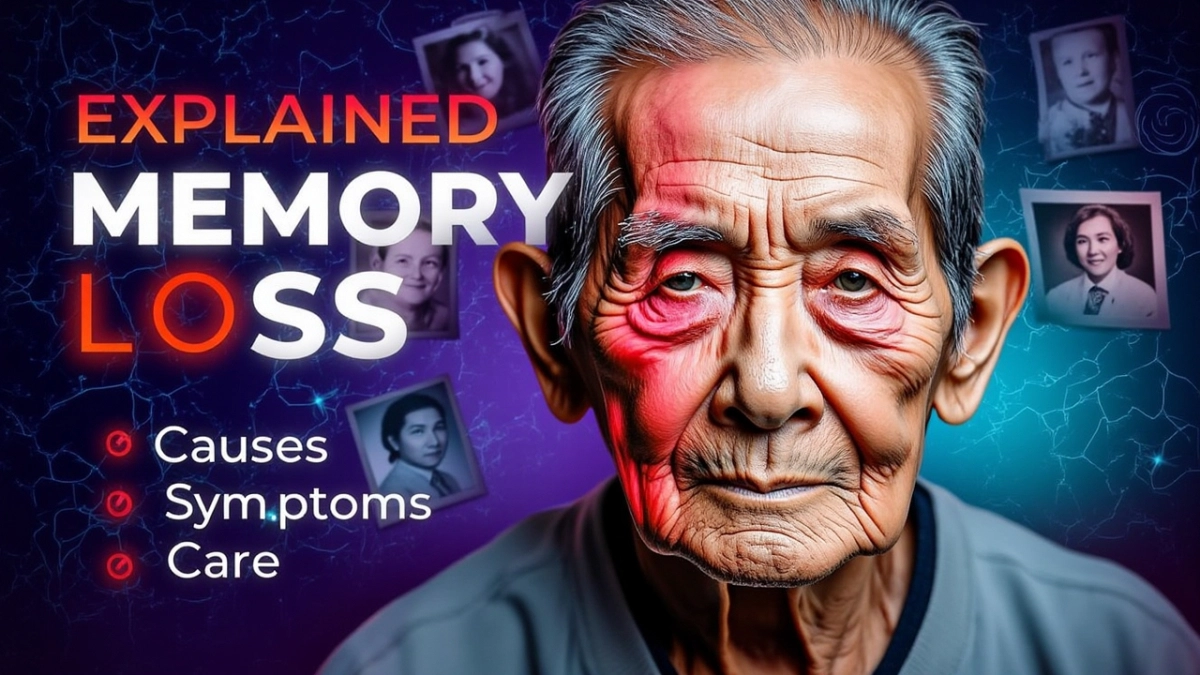Memory loss isn’t just about forgetting where you left your keys. For some people, it’s missing major life details, losing track of conversations, or struggling to recall names that once came easily. The spectrum is wide, from normal age-related forgetfulness to serious neurological conditions.
This guide digs deep into memory loss—why it happens, when it’s normal, when it signals something bigger, and what you can actually do about it.
What Do We Mean by Memory Loss?
Memory loss is more than a single problem; it’s a cluster of issues tied to how the brain stores, retrieves, and processes information. In clinical terms, it’s often referred to as amnesia or cognitive impairment, depending on the severity.
There are three broad categories:
- Short-term memory loss – forgetting recent events, like where you put your phone.
- Long-term memory loss – gaps in recalling older events, experiences, or knowledge.
- Working memory issues – trouble holding and manipulating information (like doing math in your head).
Normal Forgetfulness vs. Concerning Memory Loss
Everyone forgets things. The line between “normal” and “serious” is about pattern, frequency, and impact on daily life.
- Normal aging: occasionally forgetting names, misplacing items, needing reminders.
- Concerning signs: getting lost in familiar places, repeating the same questions, forgetting close family members, or struggling with daily tasks.
If memory loss disrupts independence, that’s a signal to seek medical evaluation.
What Causes Memory Loss?
The brain is complex, and so are the reasons memory can falter. Causes fall into several buckets:
1. Medical & Neurological Conditions
- Alzheimer’s disease – the most common cause of dementia, leading to progressive memory decline.
- Stroke or TIA – reduced blood flow damages brain areas critical for memory.
- Parkinson’s disease & Huntington’s disease – movement disorders that also affect cognition.
- Brain injury or concussion – trauma can disrupt memory pathways.
2. Mental Health Factors
- Depression – often mimics memory problems by impairing focus.
- Anxiety – constant stress overloads the brain’s working memory.
- Post-traumatic stress disorder (PTSD) – trauma can block or fragment recall.
3. Lifestyle & Environmental Triggers
- Sleep deprivation – poor rest disrupts memory consolidation.
- Alcohol & substance use – damages neurons and disrupts recall.
- Medications – sedatives, antihistamines, and certain antidepressants can impair memory.
4. Nutritional & Hormonal Factors
- Vitamin B12 deficiency – essential for nerve health.
- Thyroid disorders – both hyper- and hypothyroidism can impair memory.
- Hormonal shifts – menopause-related estrogen decline can impact cognition.
Symptoms That Point to Memory Problems
Not all forgetfulness is the same. Watch for these red flags:
- Frequently losing track of time, place, or people.
- Difficulty following conversations or instructions.
- Forgetting key life events or repeating stories.
- Mood or personality changes tied to memory decline.
- Trouble managing finances, medication, or daily routines.
How Memory Loss Is Diagnosed
Doctors don’t jump straight to Alzheimer’s. They go through a process:
- Medical history review – looking at family patterns, medications, and health conditions.
- Cognitive testing – simple memory and problem-solving exercises.
- Lab tests – checking vitamin levels, thyroid function, and other metabolic issues.
- Brain imaging (MRI/CT scans) – ruling out strokes, tumors, or structural damage.
- Neuropsychological evaluation – deep testing of different types of memory.
Treatment Options for Memory Loss
There isn’t a one-size-fits-all treatment, but here’s what works depending on the cause:
Medical Treatments
- Cholinesterase inhibitors (donepezil, rivastigmine) for Alzheimer’s.
- NMDA receptor antagonists (memantine) to slow cognitive decline.
- Antidepressants & anti-anxiety meds if mood disorders drive memory problems.
Lifestyle Approaches
- Cognitive training – brain games, puzzles, memory exercises.
- Physical activity – boosts blood flow and brain health.
- Sleep hygiene – consistent, high-quality rest.
- Diet – Mediterranean diet rich in omega-3s and antioxidants.
Alternative & Supportive Strategies
- Mindfulness and meditation – improves focus and working memory.
- Occupational therapy – practical coping strategies for daily life.
- Support groups – emotional and informational support for patients and families.
Can Memory Loss Be Prevented?
While not all causes are preventable, some lifestyle choices dramatically reduce risk:
- Stay mentally active – reading, learning new skills, social engagement.
- Eat for your brain – whole foods, fish, nuts, leafy greens.
- Protect your head – helmets, fall prevention, avoiding concussions.
- Limit alcohol and smoking – both accelerate cognitive decline.
- Regular health checks – catch thyroid issues, vitamin deficiencies, and hypertension early.
Memory Loss and Mental Health
Here’s where it gets personal: memory problems are rarely just about biology. The emotional weight is heavy—for the person experiencing it and for their loved ones.
- Anxiety around memory lapses can worsen forgetfulness.
- Depression often coexists with memory decline, creating a cycle that intensifies both conditions.
- Family impact is huge—caregivers often struggle with stress, burnout, and grief.
This is why care must be holistic: treating the brain, but also addressing mental health and support systems.
When to See a Doctor
Don’t ignore memory issues if:
- They interfere with daily independence.
- They appear suddenly or worsen quickly.
- They’re accompanied by mood, movement, or language problems.
Early intervention matters. Conditions like vitamin deficiency or thyroid imbalance can be reversed. Even in neurodegenerative disease, early care slows decline.
Actionable Takeaways
- Not all memory loss means dementia. Rule out reversible causes first.
- Lifestyle—diet, exercise, mental activity—plays a big role in prevention.
- If memory loss is sudden or disruptive, seek medical help immediately.
- Supporting mental health is just as important as addressing neurological health.
Final Word
Memory loss is not a single condition—it’s a symptom with dozens of possible roots. Some are benign, some are life-altering, but nearly all benefit from early recognition and action. By blending medical insight, practical strategies, and mental health support, we can move from fear to understanding—and from confusion to care.

